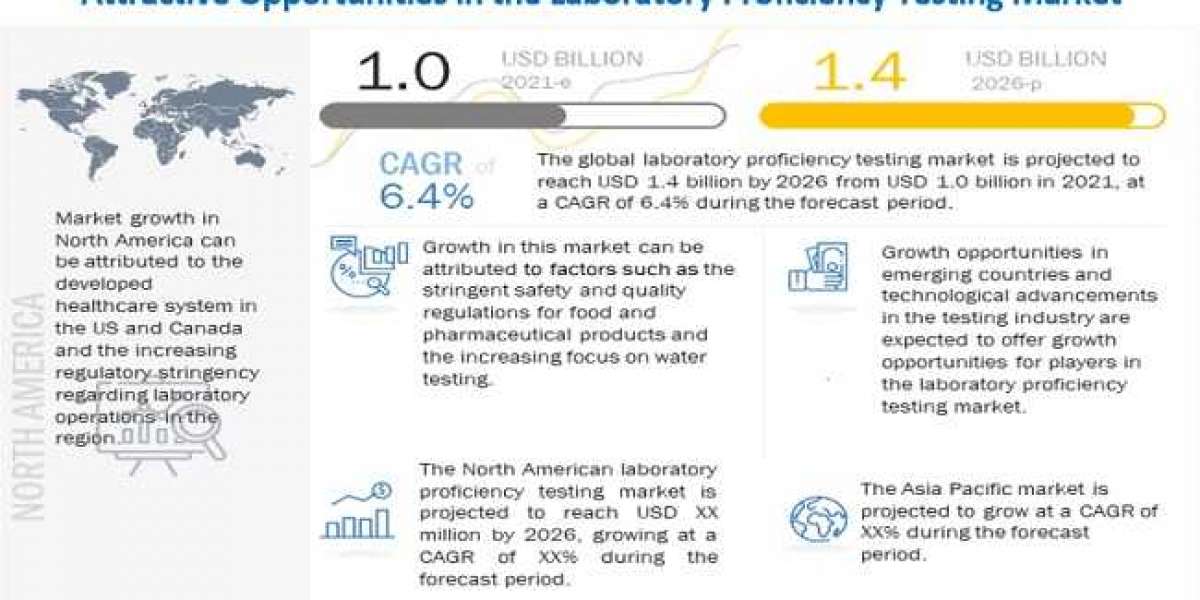The growth of this laboratory proficiency testing market is primarily driven by factors such as it forms an essential precondition for operational excellence and accreditation in several industries. Also, the increasing number of laboratory accreditations, stringent safety and quality regulations for food and pharmaceutical products and the increasing focus on water testing are the other major factors supporting market growth. However, the requirement of high capital investments for accurate and sensitive testing is expected to restrain the growth of this market during the forecast period. The growth of the pharmaceutical proficiency testing market is driven by Stringent quality control in the production of pharmaceutical products, Growth of the pharmaceuticals market, Surge in the generics market, and Emerging biosimilars market while the major restraining factor is Cost and time-intensive drug manufacturing process.
The global laboratory proficiency testing market is projected to reach USD 1.4 billion by 2026 from USD 1.0 billion in 2021, at a CAGR of 6.4%.
Download PDF Brochure: -https://www.marketsandmarkets.com/pdfdownloadNew.asp?id=144227949
Market Segmentation:
Based on industry, the laboratory proficiency testing market is segmented into clinical diagnostics, food animal feed, pharmaceuticals, microbiology, environmental, water, biologics, commercial beverages, cannabis/opioids, cosmetics, dietary supplements, and nutraceuticals. In 2020, the clinical diagnostics segment accounted for the largest share of the market. The large share of this segment is attributed to the development of complex diagnostic tests and the need for early diagnosis, which makes quality management with the use of proficiency testing an essential aspect of clinical diagnostics.
Based on technology, the global laboratory proficiency testing market has been segmented into spectrophotometry, chromatography, PCR, immunoassays, cell culture, and other technologies. The cell culture segment accounted for the largest share of the market in 2020. Growing awareness regarding the use of cell cultures in the production and testing of various clinical diagnostics samples, microbiology samples, and biopharmaceuticals is supporting the growth of this market.
Regional Analysis:
The laboratory proficiency testing market is segmented into five major regions, namely, North America, Europe, Asia Pacific, Latin America, and the Middle East Africa. In 2020, North America accounted for the largest share in the market. The large share of this region can be attributed to the mandatory adoption of laboratory proficiency testing to demonstrate operational excellence, increasing regulatory stringency regarding laboratory operations. The emerging markets across the Asia Pacific and Latin America are expected to grow at higher CAGRs during the forecast period. With significant growth in outsourcing services in the past few years, China and India have emerged as high-growth markets for laboratory proficiency testing. South Korea is another growing market in the APAC region. Other than these APAC countries, Latin American countries also show significant growth potential for the market.
Request Sample Pages: -https://www.marketsandmarkets.com/requestsampleNew.asp?id=144227949
Top Key Players :-
The prominent players in the laboratory proficiency testing market are LGC Limited (UK), American Proficiency Institute (US), College of American Pathologists (US), Bio-Rad Laboratories (US), Randox Laboratories (UK), Merck (Germany), Fapas (Fera Science Ltd.) (UK), Waters Corporation (US), Weqas (UK), AOAC INTERNATIONAL (US), BIPEA (France), NSI Lab Solutions (US), Absolute Solutions (US), Trilogy Analytical Laboratories (US), Advanced Analytical Solutions (US), American Industrial Hygiene Association (US), Matrix Sciences (US), Aashvi Proficiency Testing Analytical Services (India), and Global Proficiency (New Zealand).



